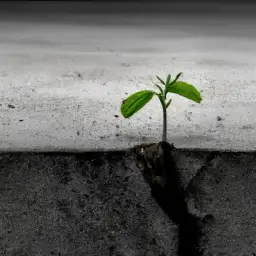You may have heard that some people are just naturally smart, while others aren’t. But what if that’s not entirely true? What if the key to academic success isn’t just innate intelligence, but something else entirely?
In this article, you’ll learn about the debate between natural talent and hard work in education, and why the concept of ‘grit’is becoming increasingly important in academic circles.
You’ll discover the science behind grit, and strategies for developing it in students.
You’ll also explore the role of parents and educators in nurturing grit, and what the future of education might look like if we shift our focus away from natural talent and towards hard work and perseverance.
Key Takeaways
- The debate between natural talent and hard work in education is ongoing, but the importance of grit in academic success cannot be denied.
- Strategies for developing grit in students include creating a safe and supportive learning environment, involving parents, and providing teacher training in promoting grit.
- The future of education focuses on teaching grit and cultivating a growth mindset, which involves taking on new challenges, setting achievable goals, embracing failure, and surrounding oneself with positive and supportive people.
- Students and athletes with higher levels of grit tend to have higher grades and achieve higher levels of performance, while psychological resilience allows individuals to bounce back from setbacks and maintain their motivation to succeed. Grit building exercises include assigning complex projects, encouraging reflection and self-assessment, and promoting the use of feedback to improve performance.
The Debate on Natural Talent vs. Hard Work
Don’t be fooled by the myth of natural talent – the debate between innate ability and hard work is a hot topic in education.
Some people believe that success is solely determined by one’s genetic makeup or ‘innate ability,’ while others argue that success is a result of hard work and perseverance.
This debate revolves around the concept of nature vs. nurture, with some believing that talent is predetermined by nature and cannot be changed, while others argue that nurture plays a larger role in determining success.
However, the myth of innate ability has been debunked time and time again. Studies have shown that those who are successful in their fields often attribute their success to hard work and dedication, rather than an inherent talent.
In fact, researchers have found that the brain is highly adaptable and can change and grow with practice and effort.
So, while some may be born with certain advantages, it is ultimately hard work and persistence that leads to success.
The Importance of Grit in Academic Success
Achieving academic success requires more than just innate abilities, as perseverance and determination play a crucial role in overcoming challenges and reaching one’s goals. It is not enough to simply have a high IQ or exceptional intellectual skills. The ability to persevere in learning and exhibit psychological resilience, even in the face of failure, is equally important in achieving academic success.
Psychological resilience allows individuals to bounce back from setbacks and maintain their motivation to succeed. This trait is especially important in the academic realm, where students often face challenges and obstacles that can be discouraging. By developing grit and perseverance, students can overcome these obstacles and continue to make progress towards their goals. In fact, studies have shown that students who exhibit these traits are more likely to achieve academic success than those who rely solely on their innate abilities.
| Positive Traits | Negative Traits | |||
|---|---|---|---|---|
| Perseverance | Giving up easily | |||
| Psychological resilience | Lack of motivation | |||
| Hardworking | Procrastination | |||
| Determination | Fear of failure | Critical thinking skills | Difficulty accepting constructive criticism |
The Science Behind Grit
You can understand why some people are able to persevere through challenges and achieve their goals by learning about the science behind psychological resilience. Researchers have developed different ways to measure grit, which is the ability to maintain long-term goals and maintain the effort to achieve them despite obstacles and failures.
One of the most widely used measures is the Grit Scale, which consists of 12 items that ask about perseverance and passion for long-term goals. Studies have found that grit is important in different contexts, including education, sports, and the workplace.
For example, students with higher levels of grit tend to have higher grades, even after controlling for other factors such as intelligence and socio-economic status. Similarly, athletes with higher levels of grit are more likely to persist through training and injuries, and ultimately achieve higher levels of performance.
These findings suggest that grit is not just a personality trait, but also a valuable skill that can be developed and applied in different areas of life.
Strategies for Developing Grit in Students
By incorporating challenging tasks and providing opportunities for growth, you as an educator can help your students develop grit and resilience.
Grit building exercises can include assigning complex projects, encouraging reflection and self-assessment, and promoting the use of feedback to improve performance. These types of tasks can help students learn how to handle setbacks and failures, and develop a growth mindset that emphasizes effort and perseverance over natural ability.
To foster a growth mindset, it’s important to create a safe and supportive learning environment. This can involve providing constructive feedback, celebrating effort over achievement, and teaching students to view challenges as opportunities for growth.
By emphasizing the process of learning rather than just the end result, you can help your students develop the mindset and skills they need to succeed not just in school, but in life. By giving them the tools they need to persevere through challenges, you can help them build the grit and resilience necessary to achieve their long-term goals.
The Role of Parents and Educators
Parents and educators play a crucial role in fostering a growth mindset and promoting resilience in students.
Parental involvement is key in instilling grit in children. Parents can model perseverance and determination in their own lives, encourage their children to take risks, and provide support and guidance during challenging times. By praising effort instead of innate ability, parents can help their children develop a growth mindset, where they believe that their abilities can be developed through hard work and dedication.
Teacher training is also essential in promoting grit in students. Educators can learn strategies for encouraging perseverance and resilience in their students, such as teaching them to set goals, providing constructive feedback, and cultivating a positive classroom culture.
By creating opportunities for students to struggle, learn from failure, and bounce back from setbacks, teachers can help students develop the skills they need to succeed both inside and outside the classroom.
With the help of engaged parents and well-trained educators, students can overcome the myth of natural talent and cultivate the grit they need to achieve their goals.
The Future of Education
So, you want to know about the future of education?
Well, one key point that educators are focusing on is the importance of teaching grit. That’s right, grit – the ability to persevere and overcome challenges.
Research shows that teaching grit can have a significant impact on student success and well-being.
So, get ready to hear more about this important topic in the years to come.
The Importance of Teaching Grit
You can cultivate your grit by pushing yourself outside of your comfort zone and embracing challenges that may seem difficult at first. As a student, it’s important to understand that you have the power to develop perseverance, mindset, character, and resilience in the classroom.
By cultivating a growth mindset, you can learn to see challenges as opportunities for growth and development, rather than something to be feared or avoided. To help you build grit, here are five things you can do:
- Take on a new challenge or hobby that you’ve been wanting to try, even if it seems intimidating at first.
- Set small, achievable goals for yourself and celebrate your progress along the way.
- Embrace failure as a learning opportunity and use it to motivate yourself to keep trying.
- Surround yourself with positive, supportive people who encourage you to push your limits.
- Practice self-care and take time for yourself to rest and recharge when you need it.
By incorporating these habits into your daily life, you’ll develop greater resilience and mental toughness, which will serve you well both in and out of the classroom. Remember, grit is not something you’re born with, but something you can cultivate through intentional effort and practice.
The Impact on Student Success and Well-Being
When students develop resilience and mental toughness, they’re more likely to experience success and well-being in all areas of their lives. Adopting a growth mindset can help students cultivate these qualities, allowing them to approach challenges with a sense of determination and a willingness to learn from their mistakes.
By focusing on effort, progress, and perseverance, rather than natural talent or intelligence, students can build their self-confidence and develop a deeper sense of purpose in their academic and personal pursuits.
To promote a growth mindset, educators can use a variety of strategies, such as providing specific feedback, modeling resilience, and encouraging students to take risks and embrace challenges. They can also help students recognize and challenge their own limiting beliefs, such as the belief that they’re not good enough or that failure is a sign of weakness.
By fostering a positive student mindset, educators can empower students to take ownership of their learning and achieve their full potential, both in and out of the classroom.
Frequently Asked Questions
What is the definition of natural talent and how does it differ from grit?
When it comes to natural talent, it refers to the innate abilities or skills that an individual possesses since birth. It’s often associated with genetics or biology and is considered to be a fixed trait that can’t be developed or improved upon.
On the other hand, grit is the perseverance and passion to achieve long-term goals, despite facing obstacles and setbacks. It’s an essential trait that’s necessary for success in education and other areas of life.
While natural talent may give someone a head start, it’s grit that helps individuals overcome challenges and achieve their full potential. The importance of grit in education can’t be overstated, as it’s the key to achieving academic success and reaching one’s full potential.
Are there any disadvantages to relying solely on natural talent in education?
If you rely solely on your natural talent, you may face several pitfalls in education. Firstly, you may become complacent and fail to put in the necessary effort to improve your skills.
Additionally, you may struggle when faced with new challenges that require skills beyond your natural abilities. This can lead to frustration, disengagement, and a lack of confidence.
On the other hand, hard work is essential for success in education. By putting in the effort to learn and develop your skills, you can overcome any challenges that come your way.
Ultimately, while natural talent can be helpful, it’s not a substitute for hard work and dedication.
How can educators identify and develop grit in students who may not naturally possess it?
To develop resilience and promote perseverance in students who may not naturally possess grit, educators must first understand that these qualities can be taught and learned.
Begin by creating a safe and supportive classroom environment that encourages risk-taking and fosters a growth mindset. Encourage students to set goals and work towards them, providing frequent opportunities for feedback and reflection.
Teach them to embrace challenges as opportunities for growth and to persist through setbacks. Model grit and resilience yourself, sharing stories of your own struggles and successes.
By intentionally focusing on developing these qualities, educators can help all students reach their full potential, regardless of natural talent or ability.
Is grit necessary for success in all academic subjects, or only in certain areas?
When it comes to academic success, grit is an important factor in achieving mastery and overcoming obstacles. This is especially true in STEM subjects, where persistence and problem-solving skills are crucial.
However, it’s important to note that grit alone isn’t enough. Developing grit through extracurricular activities can be an effective way to foster perseverance and determination in students.
While grit may not be necessary for success in all academic subjects, it can certainly be a valuable asset for students working towards mastery in challenging fields.
How can parents and educators work together to cultivate grit and discourage a fixed mindset in students?
To encourage effort and foster a growth mindset in students, you can do the following as a parent or educator:
- Acknowledge that intelligence is not fixed and that abilities can be developed through hard work and dedication.
- Emphasize the importance of effort and perseverance, and praise students for their progress and improvement rather than solely focusing on their grades or natural abilities.
- Provide opportunities for students to take on challenges and learn from mistakes, and encourage them to set realistic goals and work towards them.
- Model a growth mindset yourself by showing a willingness to learn and improve, and by reframing mistakes or setbacks as opportunities for growth.
By working together to cultivate grit and discourage a fixed mindset, you can help students develop the skills and attitudes needed for academic and personal success.
Conclusion
So, there you have it. The myth of natural talent has been debunked and replaced with the concept of grit. It’s not about being born with a certain intelligence level or skill set, but rather about putting in the effort and working hard to achieve your goals.
As a student, it’s important to develop grit and perseverance in order to succeed academically. This can be done through setting achievable goals, focusing on the process rather than the outcome, and seeking help and support when needed.
As a parent or educator, it’s crucial to encourage and foster a growth mindset in students, emphasizing the power of hard work and dedication.
The future of education is bright, with a focus on building grit and setting students up for success.









































































































